De Canadese schrijver Yann Martel werd op 25 juni 1963 geboren in Salamanca. Zie ook mijn blog van 25 juni 2007 en ook mijn blog van 25 juni 2008 en ook mijn blog van 25 juni 2009 en ook mijn blog van 25 juni 2010
Uit: Life of Pi
“The sloth is at its busiest at sunset, using the word busy here in the most relaxed sense. It moves along the bough of a tree in its characteristic upside-down position at the speed of roughly 400 metres an hour. On the ground, it crawls to its next tree at the rate of 250 metres an hour, when motivated, which is 440 times slower than a motivated cheetah. Unmotivated, it covers four to five metres in an hour.
The three-toed sloth is not well informed about the outside world. On a scale of 2 to 10, where 2 represents unusual dullness and 10 extreme acuity, Beebe (1926) gave the sloth’s senses of taste, touch, and its sense of smell a rating of 3. If you come upon a sleeping three-toed sloth in the wild, two or three nudges should suffice to awaken it; it will then look sleepily in every direction but yours.Why it should look about is uncertain since the sloth sees everything in a Magoo-like blur.Beebe reported that firing guns next to sleeping or feeding sloths elicited little reaction.And the sloth’s slightly better sense of smell should not be overestimated.They are said to be able to sniff and avoid decayed branches, but Bullock (1968) reported that sloths fall to the ground clinging to decayed branches “often”.
How does it survive you might ask.
Precisely by being so slow.Sleepiness and slothfulness keep it out of harm’s way, away from the notice of jaguars, ocelots, harpy eagles and anacondas. A sloth’s hairs shelter an algae that is brown during the dry season and green during the wet season, so the animal blends in with the surrounding moss and foliage and looks like a nest of white ants or of squirrels, or like nothing at all but part of a tree.”
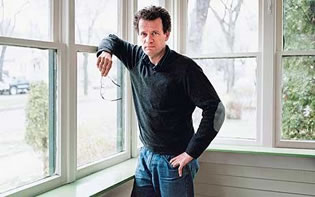
Yann Martel (Salamanca, 25 juni 1963)
De Russische dichter en vertaler Arseny Alexandrovich Tarkovsky werd geboren op 25 juni 1907 in Elisavetgrad. Zie ook mijn blog van 25 juni 2007 en ook mijn blog van 25 juni 2008.en ook mijn blog van 25 juni 2009 en ook mijn blog van 25 juni 2010
Life, Life
1
I don’t believe in omens or fear
Forebodings. I flee from neither slander
Nor from poison. Death does not exist.
Everyone’s immortal. Everything is too.
No point in fearing death at seventeen,
Or seventy. There’s only here and now, and light;
Neither death, nor darkness, exists.
We’re all already on the seashore;
I’m one of those who’ll be hauling in the nets
When a shoal of immortality swims by.
2
If you live in a house – the house will not fall.
I’ll summon any of the centuries,
Then enter one and build a house in it.
That’s why your children and your wives
Sit with me at one table, –
The same for ancestor and grandson:
The future is being accomplished now,
If I raise my hand a little,
All five beams of light will stay with you.
Each day I used my collar bones
For shoring up the past, as though with timber,
I measured time with geodetic chains
And marched across it, as though it were the Urals.
Vertaald door Virginia Rounding
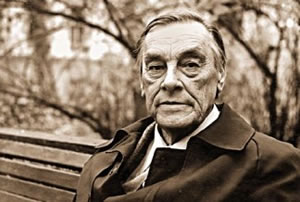
Arseny Tarkovsky (25 juni 1907 – 27 mei 1989)
De Duitse dichter, schrijver en ingenieur Heinrich Seidel werd geboren op 25 juni 1842 in Perlin, Mecklenburg-Schwerin. Zie ook mijn blog van 25 juni 2009 en ook mijn blog van 25 juni 2010
In der Sommerabendsonne – I.
An dem schönen Sommerabend
Saßen wir auf jenem Hügel,
Schauten in den goldnen Westen.
Breithin streckte sich die dunkle
Wolkenbank, darin die Sonne
Nun versunken – nur die Ränder
Glühten noch in goldnem Scheine.
Doch im blauen Himmel drüber
Schwebten rosig weiße Wolken
Angestrahlt von hellem Glanze.
Welch’ ein Wunder sah ich droben:
Auf den Wolkenbänken saßen
Ros’ge Engel reihenweise –
Andre lauschten aus den Wolken,
Andre schwebten hin und wieder,
Spielten hier mit Wolkenflocken,
Ritten dort auf einem Wölkchen –
Und es war ein stillbewegtes
Schimmernd rosiges Getümmel.
“Sieh, wie herrlich!” sprach ich leuchtend
Freudevoll zu dem Gefährten.
Dieser nickte nur; wir schauten
Still in’s Zauberspiel der Wolken:
Wie die Engel nun verschwebten,
Lauschten noch mit ros’gen Köpfen
Ueber Wolken und verschwanden.
Und der Rosenschein verblaßte,
Bis im bläulichen Gedämmer
Nur ein träumend Roth noch ruhte,
Und der Abend still sich senkte.
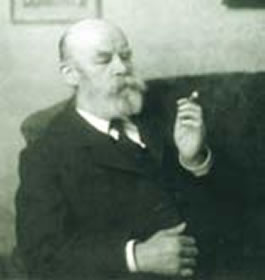
Heinrich Seidel (25. Juni 1842 – 7. November 1906)
De Engelse schrijver Nicholas Mosley werd geboren op 25 juni 1923 geboren in Londen.Zie ook mijn blog van 25 juni 2009.
Uit: Hopeful Monsters
“My father said ‘Shall I try to explain?’
I said ‘I like hearing you talk. It doesn’t matter if I don’t understand.’
This was the time – the winter of 1918-19 – when Einstein had recently published his paper concerning the General Theory of Relativity (the papers concerning the Special Theory had been published some years previously), but the conjectures put forward in the General Theory had not yet been verified. Nothing in these theories had yet much caught the public imagination: people seemed not to be ready for such images as they might evoke. But my father had become obsessed with trying to make intelligible an interpretation of the General Theory: it was this, he said, that should alter people’s ideas about the universe and about themselves.
My father said ‘All right, I’ll try to tell you. I’m not sure, anyway, just what it means to understand.’
I think my father had already tried to explain – usually more to himself in fact than to me – the Special Theory of Relativity. I remember the phrases about there being no absolute space nor absolute time: my space is my space; your time is yours; if I am travelling at a certain speed in relation to you it might as well be you who are travelling at a certain speed in relation to me; the only thing that is absolute is the speed of light. The speed of light is constant no matter if it arises from this or that travelling hither or thither: if there seem to be contradictions, these are because the measuring devices themselves get bigger or smaller and not the speed of light. I do not suppose I grasped the latter idea: but I do not think I found it difficult to see the idea of each person, each observer or group, having his or her or its own world: was not this, after all, what I had come to feel about the people in the streets, my mother’s friends, her cousins in the country? I felt sometimes that I understood even about the absoluteness of the speed of light – was not this something that my father and I felt ourselves in touch with as we looked down on all these separate worlds from the superworld of our airship?
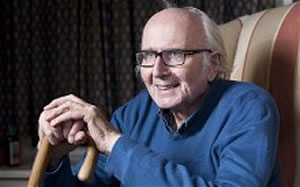
Nicholas Mosley (Londen, 25 juni 1923)
De Franse schrijver Claude Seignolle werd geboren op 25 juni 1917 in Périgueux. Zie ookmijn blog van 25 juni 2009.
Uit: Le Retour à Tiburiac
“Embrassai ses paupières closes ; ses cheveux qui gardèrent mon souffle. Je l’avais toute à moi. Elle acceptait enfin l’échange de nos désirs. Soudain, elle eut un cri de détresse si terrible que d’un bond, je m’écartai d’elle. Effrayé, je la regardai. Elle restait allongé, mais ses yeux me fixaient, comme atteints de folie, et exprimaient le vertige d’une lutte telle, qu’un violent frisson me traversa… Ses doigts agrippèrent le drap en une prise féroce… De sa gorge sortit une plainte, un râle qui se gonfla jusqu’à l’ettoufer … Convulsée par un spasme furieux, elle fit le geste de me saisir à la gorge, mais ses bras retombèrent, la vie brusquement coupée en elle …
Alors… alors, je mordis mes poings jusqu’au sang afin de ne pas hurler de ce que je vis en un instant … Elle se raidit…Sa peau se flétrit… verdit… se creva çà et là, laissant l’os apparaître dans une puanteur croissante, si fétide qu’elle m’écroula de nausées… Je vis ses traits se fondre en une infecte boule putride, son crâne surgir, puis ses vertèbres, ses côtes… Et Dieu me fut bon, qui m’avait arrêté de la dénuder completement, sinon j’aurai vu se crever son ventre pourri que sa robe virginale, de satin et de soie, garda au secret de l’horreur… Mais l’étoffe vieillit à son tour, comme de plusieurs siècles, et il n’y eut plus sur ma couche souilée que ces macabres restes d’os blanchis, enveloppés d’une sorte de sac flétri semblable à ceux du “Trou aux Huguenots “…
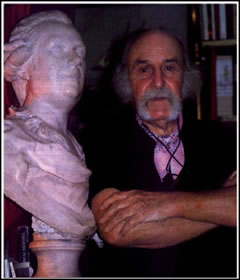
Claude Seignolle (Périgueux, 25 juni 1917)
